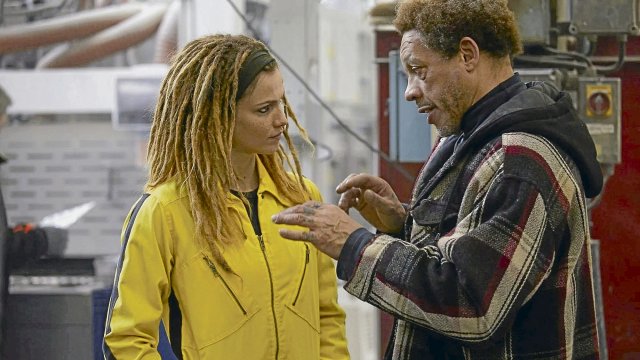The factory as a school: The deserted elite soldier Machine (Margot Bancilhon) and the ex-junkie JP (Joey Starr) have a lot to say to each other – for example about council communism.
Photo: Art
What can you expect from a TV series that begins with a quote from Emmanuel Macron? Well, the French President sometimes has interesting impulses. In this case, it is a sentence that he formulated in 2018 on the occasion of the 200th birthday of a German philosopher: “My advice to young people: Read Karl Marx.”
This quote precedes every episode of the six-part Arte television series “Machine,” which tells of the return of an elite soldier (played by Margot Bancilhon) to the northeastern French province. The fact that this small town, which has been plagued by deindustrialization, is located near Reims gives the film another point of reference to the left-wing debate. One might think that “Machine” is one of those workers’ films that have been released from France in recent years: a local washing machine factory is bought by a foreign investor and liquidated with the support of the political authorities. There is a strike and the communist union CGT tries to negotiate a social plan. But one of the workers, played by 56-year-old rapper Joey Starr, backs down and calls on his colleagues to take matters into their own hands: worker self-management. This JP, a former junkie, fought his way out of the drug swamp through cycling and Karl Marx. From his reading, he knows that the working class has the knowledge to run the business themselves.
Wait a minute: reading Karl Marx turns a heroin addict into council communism? The fact that this series is not social realism but an action fairy tale is briefly established in the very first scene preceding the factory events. Immediately after Emmanuel Macron’s quote, you see uniformed men brutally attacking a suburban family. This opening is not just an action scene, but a political statement. “Machine” is a film against police violence.
The person the task force is looking for is the very “Machine” that gives the series its name. She was deployed as a fighting machine for the ailing French imperialism in Africa and, addicted to alcohol and severely traumatized, deserted from the ranks of the Foreign Legion. Hardly recognizable with her long dreadlocks, she now returns to her hometown to find that her grandmother, her last living relative, has died. Completely penniless, “Machine” is hired at the factory where JP is instigating the workers’ uprising against investors and reformist trade unionists.
Because ex-junkie JP once abandoned his own daughter, he develops the desire to support his much younger colleague. He wants to get her away from alcohol, takes her cycling and introduces her to the beauty of materialistic philosophy. “Machine” is initially annoyed, but then orders “Das Kapital” – of course, the story must not drift completely into the fantastic, as a comic version. And with this transformation, the series finally changes genre: the factory film becomes a kung fu epic à la “Kill Bill”, albeit intelligently.
Unlike the US filmmaker Quentin Tarantino, the caricature here is not simply an aesthetic reminiscence of cinema history, but rather solves a narrative problem: the social realist narrative about the labor conflict would inevitably degenerate into a pedagogical lesson. With the genre change to the Kung Fu film, everything is suddenly possible, and so the superhero “Machine” determines the events from now on.
This also works because the kung fu scenes are staged in a way that has not been seen often in European cinema. Actress Margot Bancilhon only acquired her knowledge of martial arts while preparing for the film, but she kicks and fights her way through the series, making it a real joy. Everyone gets their fill: scabs, a fascist taxi squad and finally a squad of killers who are flown in from Korea by the owner.
The authors Thomas Bidegain, Valentine Monteil and Fred Grivois are behind this peculiar story, which obviously aims to bring the council communist Karl Marx closer to a young audience previously only familiar with action films. Bidegain was the screenwriter of the great films “The Prophet” and “Demons and Miracles”. The previous films by the Canadian Grivois, who also directed “Machine,” were often considered too flat by critics. But with Bidegain and Monteil at his side, Grivois’ joy in action films develops a productive force. The pop culture Kung Fu fairy tale becomes a clever and sometimes touching story about social conditions. Located somewhere between “Return to Reims” and “Kill Bill,” “Machine” is a rare stroke of luck on public television.
Runs on Arte
Become a member of the nd.Genossenschaft!

Since January 1, 2022, the »nd« will be published as an independent left-wing newspaper owned by the staff and readers. Be there and support media diversity and visible left-wing positions as a cooperative member. Fill out the membership form now.
More information on www.dasnd.de/genossenschaft
